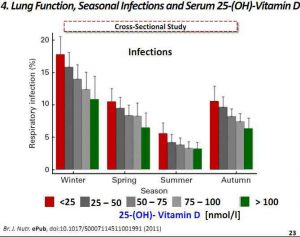Vitamin D and The Flu and Covid: Boost your Immune System
________________________________
What does Vitamin D do in the body?

Vitamin D helps keep the bones strong
It also helps keep the immune system healthy
It helps the intestines absorb calcium
Plus: Vitamin D and the Flu: * a global study of 11,000 people has confirmed that vitamin D supplementation can help protect against acute respiratory infections (colds, flu) (see below for more information)
________________________________
How do we get Vitamin D?

Vitamin D is absorbed through our skin from sunlight
It is also contained in egg yolks and fish liver found in salmon and sardines
It is also added to foods such as milk and baby formula
________________________________
What is the recommended dose of Vitamin D?

Vitamin D dosing is between 600 IU – 4000 IU a day depending on age and health status
The Institute of Medicine’s Recommended Dietary Allowance (RDA) of vitamin D for ages 18 years through age 70 years is 600 (IU) international units daily.
The RDA is 800 (IU) international units daily after age 70 years.
The Institute of Medicine (IOM) has defined the “tolerable upper intake level” of vitamin D as 4000 (IU) international units daily for healthy adults
Taking more than 5,000 IU a day of vitamin D increases the risk of side effects
________________________________
Does Vitamin D help against Covid-19?
A recent study at Boston University Medical Center completed in September 2020 showed that healthy levels of Vitamin D reduced complications from Covid-19 and greatly lowered the risk of dying.
“This study provides direct evidence that vitamin D sufficiency can reduce the complications, including the cytokine storm (release of too many proteins into the blood too quickly) and ultimately death from COVID-19,” explained corresponding author Michael F. Holick, PhD, MD, professor of medicine, physiology and biophysics and molecular medicine.
LINK JAMA Abstract Vit D and COVID Study Sept 2020
________________________________
Does Vitamin D protect against the Flu or Colds?

A large meta-analysis study published in 2017 in the BMJ (British Medical Journal) of 11,000 participants concluded that Vitamin D supplementation was safe and it protected against acute respiratory tract infection overall. LINK British Medical Journal Study
Patients who were very vitamin D deficient experienced the most benefit.
The study showed that all participants experienced some beneficial effects from regular vitamin D supplementation. Administering occasional high doses of vitamin D did not produce significant benefits.
The study was funded by a grant from the National Institute of Health Research (U.K.).
LINK What Causes the Flu and How to Treat the Flu
________________________________
How much is too much Vitamin D?
A person can never overdose on vitamin D obtained from sunlight.
The Institute of Medicine (IOM) has defined the “tolerable upper intake level” of vitamin D as 4000 (IU) international units daily for healthy adults and children 9 to 18 years.
Studies show that vitamin D > 60,000 IU a day can cause elevated calcium which can cause: confusion, excessive thirst and urination, loss of appetite, vomiting, and muscle weakness.
________________________________
Who can have LOW Vitamin D levels?
- People with Crohn’s disease, Chronic renal failure, malabsorption syndromes such as celiac disease of cystic fibrosis
- People who don’t get enough sunlight
- Elderly whose skin does not absorb sunlight well
- Chronic steroid use causes vitamin D and calcium not to be absorbed properly
- Vitamin D levels decline in winter
_____________________
What happens with prolonged LOW Vitamin D levels?
Lack of vitamin D leads to reduced intestinal absorption of calcium and phosphorus.
Low levels of vitamin D can lead to osteoporosis (thinning of the bones) and increased risk of fractures.
Long term lack of vitamin D can lead to a further weakening of the bones called osteomalacia or rickets.
________________________________
Mayo Clinic Opinion on Vitamin D
“Vitamin D is Generally Safe”
“Without vitamin D your bones can become soft, thin and brittle. Insufficient vitamin D is also connected to osteoporosis and some types of cancer. If you don’t get enough vitamin D through sunlight or dietary sources, you might need vitamin D supplements.”
________________________________
Safety and side effects
Taken in appropriate doses, vitamin D is generally considered safe.
However, taking too much vitamin D can be harmful.
It is possible for people who take more than 5,000 IU a day of vitamin D to experience:
- Nausea / Vomiting
- Poor appetite
- Constipation
- Weakness
- Weight loss
- Confusion
- Heart rhythm problems
- Kidney damage
_____________________
Interactions with other drugs
Possible drug interactions include:
- Aluminum. Taking vitamin D and aluminum-containing phosphate binders long term might cause harmful levels of aluminum in people with kidney failure.
- Anticonvulsants. The anticonvulsants phenobarbital and phenytoin (Dilantin, Phenytek) increase the breakdown of vitamin D and reduce calcium absorption.
- Atorvastatin (Lipitor). Taking vitamin D might affect the way your body processes this cholesterol drug.
- Calcipotriene (Dovonex). Don’t take vitamin D with this psoriasis drug. The combination might increase the risk of too much calcium in the blood (hypercalcemia).
- Cholestyramine (Prevalite). Taking this weight-loss drug can reduce your absorption of vitamin D.
- Cytochrome P450 3A4 (CYP3A4) substrates. Use vitamin D cautiously if you’re taking drugs processed by these enzymes.
- Digoxin (Lanoxin). Avoid taking high doses of vitamin D with this heart medication. High doses of vitamin D can cause hypercalcemia, which increases the risk of fatal heart problems with digoxin.
- Diltiazem (Cardizem, Tiazac). Avoid taking high doses of vitamin D with this blood pressure drug. High doses of vitamin D can cause hypercalcemia, which might reduce the drug’s effectiveness.
- Orlistat (Xenical, Alli). Taking this weight-loss drug can reduce your absorption of vitamin D.
- Thiazide diuretics. These blood pressure drugs might decrease urinary calcium excretion. This could lead to hypercalcemia if you are taking vitamin D.
- Steroids. Taking steroid mediations such as prednisone can reduce calcium absorption and impair your body’s processing of vitamin D.
- Stimulant laxatives. Long-term use of high doses of stimulant laxatives can reduce vitamin D and calcium absorption.
- Verapamil (Verelan, Calan). Avoid taking high doses of vitamin D with this blood pressure drug. High doses of vitamin D can cause hypercalcemia, which might reduce the drug’s effectiveness.
________________________________
Research about Vitamin D
(as seen in MayoClinic.com LINK Mayo Clinic Vitamin D)
- Possible reduced risk of flu
- Another 2018 review of existing research in the MedPub database suggested that vitamin D may have a protective effect against the influenza virus.
- However, the authors also looked at other studies where vitamin D did not have any effect on the flu
- Therefore, further research is necessary to confirm the protective effect of vitamin D on the flu
-
The studies clearly show that vitamin D is part of a complex system which affects the immune response. So, assessing vitamin D status and maintaining optimal serum levels [of vitamin D] should be considered in all … adults and children.

- Cancer. Research suggests that vitamin D, especially when taken with calcium, might help prevent certain cancers (colorectal, breast, prostate mainly). Further testing is still ongoing. For more detailed information on cancer studies being done, see the National Cancer Institute.
LINK National Cancer Institute
- Auto-Immune Disease.
From the NIH: National Institute of Health:
“As immune cells in autoimmune diseases are responsive to the effects of vitamin D, the beneficial effects of supplementing vitamin D deficient individuals with autoimmune disease have been seen.”
LINK NIH Article Vitamin D and the Immune System
- Cognitive health. Early research suggests that vitamin D might play a role in cognitive health. In one small study of adults age 60 years and older being treated for dementia, researchers found that taking a vitamin D supplement helped improve cognitive function.
- Multiple sclerosis. Research suggests that long-term vitamin D supplementation reduces the risk of multiple sclerosis.
- Osteomalacia. Vitamin D supplements are used to treat adults with severe vitamin D deficiency, resulting in loss of bone mineral content, bone pain, muscle weakness and soft bones (osteomalacia).
- Osteoporosis. Studies suggest that people who get enough vitamin D and calcium in their diets can slow bone mineral loss, help prevent osteoporosis and reduce bone fractures.
- Psoriasis. Applying vitamin D or a topical preparation that contains a vitamin D compound called calcipotriene to the skin can treat plaque-type psoriasis in some people.
- Rickets. This rare condition develops in children with vitamin D deficiency. Supplementing with vitamin D can prevent and treat the problem.
- _____________________
References
https://www.mayoclinic.org/drugs-supplements-vitamin-d/art-20363792
https://www.medicalnewstoday.com/articles/161618.php
E. Laird, H. McNulty, M. Ward, L. Hoey, E. McSorley, J. M. W. Wallace‡, E. Carson, A. M. Molloy, M. Healy, M. C. Casey, C. Cunningham, and J. J. Strain. Vitamin D Deficiency Is Associated With Inflammation in Older Irish Adults. Journal of Clinical Endocrinology & Metabolism, February 2014
Vitamin D and The Flu and Covid: Boost your Immune System





Pingback: Coronavirus Daily Update 4/26 At 11:30 Am - Live One Good Life
Pingback: Coronavirus Daily Events April 2020 - Live One Good Life